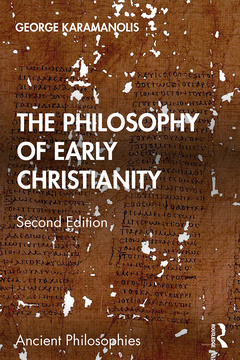The Philosophy of Early Christianity (2nd Ed.) Ancient Philosophies Series
Auteur : Karamanolis George

This new edition introduces the reader to the philosophy of early Christianity in the second to fourth centuries AD, and contextualizes the philosophical contributions of early Christians in the framework of the ancient philosophical debates.
It examines the first attempts of Christian thinkers to engage with issues such as questions of cosmogony and first principles, freedom of choice, concept formation, and the body?soul relation, as well as later questions like the status of the divine persons of the Trinity. It also aims to show that the philosophy of early Christianity is part of ancient philosophy as a distinct school of thought, being in constant dialogue with the ancient philosophical schools, such as Platonism, Aristotelianism, Stoicism, and even Epicureanism and Scepticism. This book examines in detail the philosophical views of Christian thinkers such as Justin Martyr, Clement of Alexandria, Irenaeus, Tertullian, Origen, Basil, and Gregory of Nyssa, and sheds light in the distinct ways they conceptualized traditional philosophical issues and made some intriguing contributions. The book?s core chapters survey the central philosophical concerns of the early Christian thinkers and examines their contributions. These range across natural philosophy, metaphysics, logic and epistemology, psychology, and ethics, and include such questions as how the world came into being, how God relates to the world, the status of matter, how we can gain knowledge, in what sense humans have freedom of choice, what the nature of soul is and how it relates to the body, and how we can attain happiness and salvation. This revised edition takes into account the recent developments in the area of later ancient philosophy, especially in the philosophy of Early Christianity, and integrates them in the relevant chapters, some of which are now heavily expanded.
The Philosophy of Early Christianity remains a crucial introduction to the subject for undergraduate and postgraduate students of ancient philosophy and early Christianity, across the disciplines of classics, history, and theology.
Preface to the Second Edition; Preface to the First Edition; Abbreviations; Introduction; Chapter 1, The Christian Conception of Philosophy and Christian Philosophical Methodology; Chapter 2, Physics and Metaphysics: First Principles and The Question of Cosmogony; Chapter 3, Logic and Epistemology; Chapter 4, Free Will and Divine Providence; Chapter 5, Psychology: The Soul and Its Relation to The Body; Chapter 6, Ethics and Politics; Conclusion; Appendix, The Protagonists; Bibliography
George Karamanolis is Associate Professor in the Department of Philosophy, University of Vienna, Austria. His publications include Plato and Aristotle in Agreement? Platonists on Aristotle from Antiochus to Porphyry (2006; revised paperback, 2013), Studies on Porphyry (2007, ed. with Anne Sheppard), The Aporetic Tradition in Ancient Philosophy (2017, ed. with Vasilis Politis), Pseudo-Aristotle: De Mundo (On the Cosmos): A Commentary (2020, ed. with Pavel Gregoric).
Date de parution : 05-2021
15.6x23.4 cm
Disponible chez l'éditeur (délai d'approvisionnement : 14 jours).
Prix indicatif 45,15 €
Ajouter au panierDate de parution : 05-2021
15.6x23.4 cm
Disponible chez l'éditeur (délai d'approvisionnement : 14 jours).
Prix indicatif 160,25 €
Ajouter au panierThèmes de The Philosophy of Early Christianity :
Mots-clés :
Early Christian Philosophers; Early Christian Thinkers; early christian philosophy; Early Christian; philosophy of early christianity; Hellenic Philosophers; later ancient philosophy; Soul Body Relation; late antique philosophy; Origen’s Theory; early christian thought; Pagan Philosophers; christianity and pagan philosphy; De Hom; christianity and aristotle; De Ira Dei; christianity and plato; Contemporary Platonists; christianity and stoicism; Christian Philosophers; christianity and the stoics; Non-rational Desires; christianity and Neoplatonism; Plato’s Texts; christianity and Neoplatonists; Christian Thinkers; early christian philosophy and slavery; Living Functions; early christian ethics; Astral Determinism; early christian logic; Origen Claims; early christian epistemology; Philosophical Issues; Christian conception of philosophy; De Praescriptione Haereticorum; Christian philosophical methodology; Entire Human Nature; early christian metaphysics; Hellenic Tradition; free will in early christian philosophy; Pagan Contemporaries; free will in early christian thought; Human Free Choice; divine providence in early christian thought; Pre-existing Matter; divine providence in early christian philosophy; Early Christian Thinking; the soul in early christian thought; the soul in early christian philosophy; early christian political philosophy; De anima et resurrectione; moral psychology in christian thought; Aristotelianism; Stoicism; Pagan philosophy; Hellenic philosophy



